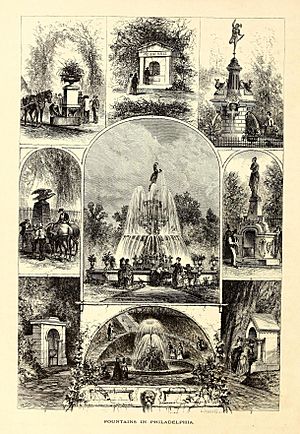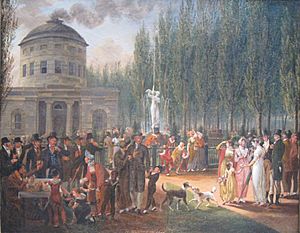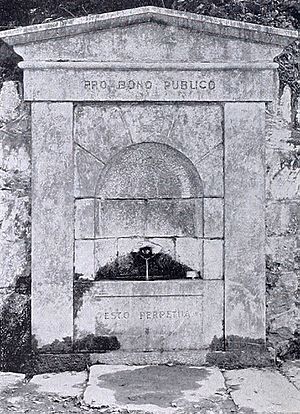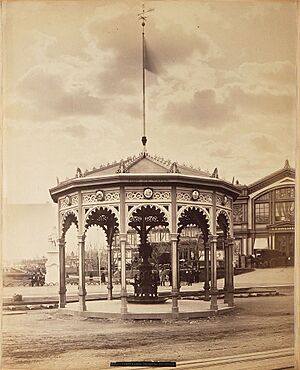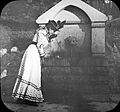Drinking fountains in Philadelphia facts for kids
Public drinking fountains in Philadelphia, Pennsylvania, have been around since the 1800s. Many groups in the city wanted these fountains. They believed public fountains would help keep people healthy. At that time, clean water was not always easy to find.
Some groups, like the Woman's Christian Temperance Union, thought free, clean water would help people choose water instead of alcohol. Animal welfare groups, such as the Society for the Prevention of Cruelty to Animals, also wanted to help. They wanted to give water to the city's working horses and dogs. This is why many old Philadelphia fountains have lower troughs for animals.
Contents
The Story of Philadelphia's Fountains
Early Water Systems
In the 1790s, Philadelphia faced serious yellow fever outbreaks. To fight this, the Philadelphia Watering Committee was formed. Their goal was to build a public water system. Architect Benjamin Henry Latrobe designed this system.
Water from the Schuylkill River flowed through an underground brick tunnel. It went to Centre Square, where Philadelphia City Hall is now. Steam pumps then pushed the water into a tank. From there, gravity sent water through wooden pipes across the city. This system, finished in 1801, was the first citywide public water system in the United States.
In 1802, Frederick Graff, Latrobe's main assistant, designed a special "T"-shaped fire hydrant. It had a drinking fountain on one side and a water pipe on the other. These hydrants were placed on all major streets.
The pumping house and its gardens became a popular spot. Graff later designed the fountain for Centre Square. Sculptor William Rush created a statue for it called Allegory of the Schuylkill River. It is better known as Water Nymph with Bittern. This was Philadelphia's first public fountain, opened in 1809.
The First Public Fountains
The idea of special public drinking fountains was quite new. The first ones in England appeared in Liverpool in 1854. London got its first in 1859.
Philadelphia's "First Fountain" was built in 1854. It was located along the Wissahickon Creek. This fountain used water from a cold mountain spring. It had a lion's head spout and a marble basin. Words carved on it said "Pro bono publico" (for the public good) and "Esto perpetua" (may it be everlasting).
In the 1860s, groups across the U.S. started funding water fountains. The Philadelphia Fountain Society began in 1869. These new fountains were very popular. By September 1869, the Fountain Society had built 12. The Pennsylvania SPCA had built 5 more. By 1880, the Philadelphia Fountain Society had 50 fountains. They served about 3 million people and 1 million animals. Fountains continued to be installed until the 1940s, and many are still around today.
In 2015, there were talks about bringing back a system of public drinking fountains in Philadelphia.
Who Built the Fountains?
Philadelphia Fountain Society
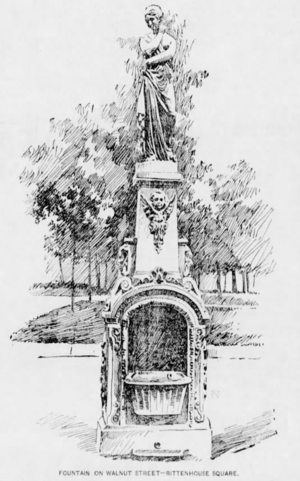
The Philadelphia Fountain Society built the most fountains. It was led by Dr. Wilson Cary Swann. The society started in 1869. Its goal was to build water fountains and troughs for people and animals. Swann believed that providing water would help workers stay healthy and avoid taverns.
The society's fountains were meant to be useful, but many were also beautiful. They often included designs by famous artists. The society asked Philadelphians for donations to help build more fountains.
The first fountain by the society was placed near Washington Square in April 1869. It had an iron eagle on top and two troughs below, one for horses and one for dogs. Important citizens like John Wanamaker helped fund the society. By July, there were five fountains. Two years later, the society managed 43 fountains. By 1874, Swann had overseen the building of 73 fountains.
The society faced challenges. It was hard to pay for ongoing repairs. The city stopped helping with maintenance in the 1880s. Fountains were often damaged by vandals or careless wagon drivers.
Dr. Swann died in 1876. By 1892, the number of fountains managed by the society dropped to 60. As cars became more popular, fewer horses were in the city. This meant less need for horse troughs. The society stopped building new fountains after its last big project, the Swann Memorial Fountain, in 1924. At its busiest, the society managed 82 fountains. It still exists today as a group that gives grants.
Society for the Prevention of Cruelty to Animals
The Pennsylvania branch of the American Society for the Prevention of Cruelty to Animals (PSPCA) also built fountains. It was co-founded in 1868. The Fountain Society and the PSPCA worked together. They both wanted to help people and animals. Many of their fountains had a low trough for small animals and a separate fountain for people.
Caroline Earle White helped start the PSPCA. But she felt left out of decisions. So, she created the Women's Branch of the PSPCA. This group also built public drinking fountains and horse troughs.
Women's Pennsylvania Society for the Prevention of Cruelty to Animals
In 1899, Caroline Earle White started her own group, the Women's Pennsylvania Society for the Prevention of Cruelty to Animals (WPSPCA). This group continued to build fountains. Annie L. Lowry, a wealthy widow, gave a lot of money to the WPSPCA. She funded several horse fountains. In her will, she left $10,000 for more fountains and $20,000 to start the first animal shelter in the U.S.
The WPSPCA worked to improve conditions for animals. They noticed that many water troughs were dirty. They asked saloon owners to clean them. Then, they decided to build their own clean fountains. In six years, they built 40 fountains and troughs. The city helped by providing free water.
By 1928, the WPSPCA still ran an animal hospital and shelter. They also maintained 50 street fountains all year. They set up extra seasonal watering stations for horses from May to November.
Temperance Organizations
The Woman's Christian Temperance Union also ordered fountains. These fountains were very popular in busy parts of the city.
The local Sons of Temperance group paid for a drinking fountain. It was first at the 1876 Centennial Exposition. Later, it moved to Independence Square in 1877. It famously offered "ICE WATER FREE TO ALL."
Another large fountain for the 1876 exposition was the Catholic Total Abstinence Union Fountain. It had five figures and sixteen drinking fountains.
Notable Drinking Fountains
| Name | Date | Image | Location | Sponsor/Designer | Material | Notes |
|---|---|---|---|---|---|---|
| "First Fountain" | 1854 | 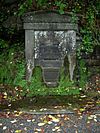 |
Forbidden Drive, Wissahickon Valley | John Cook and Charles Magargé | white marble | This fountain was given to the Park Commission for public use. It was sealed in 1957 due to water pollution. |
| Peace Fountain | 1865 | 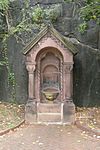 |
Fairmount Water Works, South Garden | brownstone | This wall fountain is set against a granite cliff. The inscription "Peace June 1865" refers to the end of the American Civil War. | |
| Washington Square Fountain | 1869 |  |
Original: 7th & Walnut Streets Current: 615 S. Washington Square |
Philadelphia Fountain Society | granite | This was the first fountain built by the Philadelphia Fountain Society. It was moved in 1916. |
| Tyler Memorial Fountain | 1869 |  |
Original: Chestnut Street (in front of Independence Hall) Current: 312 Arch Street |
Philadelphia Fountain Society | granite | One of two fountains placed in front of Independence Hall. This one was moved in 1942. |
| Lemon Hill Spring | around 1870 | 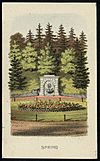 |
Kelly Drive & Sedgeley Drive, East Fairmount Park | white marble | Also known as Marble Drinking Fountain or Lion's Head Fountain. | |
| In Aqua Sanitas Fountain | 1870-1871 |  |
Martin Luther King Jr. Drive, West Fairmount Park | granite | The inscription means "In Water Health." | |
| Catholic Total Abstinence Union Fountain | 1874–1877 |  |
Fountain Drive, West Fairmount Park | Catholic Total Abstinence Union Herman Kirn, designer |
granite | This large fountain was built for the 1876 Centennial Exposition. It had 16 drinking fountains. |
| Temperance Fountain | 1876 | 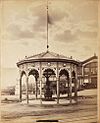 |
Original: 1876 Centennial Exposition Current: in storage |
Grand Division of the Sons of Temperance | cast iron | This fountain offered free ice water. It was moved to Independence Square in 1877 and later put into storage in 1969. |
| Lion's Head Fountain | 1878 | 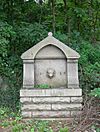 |
Original: Lincoln Drive, Wissahickon Valley Current: Kelly Drive, East Fairmount Park |
Fairmount Park Art Association | granite | This fountain was moved from its original location. |
| Orestes and Pylades Fountain | 1884 | 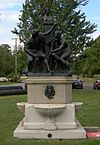 |
33rd Street & Reservoir Drive, East Fairmount Park | Fairmount Park Art Association Carl Johann Steinhäuser, sculptor |
bronze & granite | This fountain features bronze figures and water pouring from four masks. |
| Catharine Thorn Memorial Fountain | 1890 |  |
23rd Street, South Street & Grays Ferry Avenue | Women's Pennsylvania Society for the Prevention of Cruelty to Animals | granite | Funded by money Catharine Thorn left to the society in her will. |
| Forepaugh Horse Trough | 1895 | 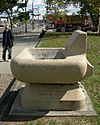 |
Fairhill Square, 4th Street & Lehigh Avenue | Philadelphia Fountain Society | granite | This fountain was a gift to the Philadelphia Fountain Society from a lady. |
| William Leonidas Springs Fountain | 1899 |  |
Lincoln Drive, Wissahickon Valley | Jeanette S. Springs, donor | granite | This fountain was built in memory of William Leonidas Springs. It was sealed in the 1940s due to water pollution. |
| Class of 1892 Drinking Fountain | 1900 |  |
Quadrangle Dormitories, University of Pennsylvania | University of Pennsylvania Class of 1892 Alexander Stirling Calder, designer |
bronze & granite | This fountain shows a student and a football player. |
| Grace and Beauty Fountain | around 1901 |  |
Horticultural Center, West Fairmount Park | white marble | ||
| Bell H. Crump Fountain | 1907 |  |
Original: Broad Street, Fairmount Avenue & Ridge Avenue Current: 350 E. Erie Avenue |
Pennsylvania Society for the Prevention of Cruelty to Animals | granite | This was one of the largest drinking fountains for horses and dogs. It was moved in 1954. |
| Mary Rebecca Darby Smith Memorial Fountain | 1908 |  |
Original: 12th & Spring Garden Streets Current: Horticultural Drive, West Fairmount Park |
Philadelphia Fountain Society John J. Boyle, sculptor |
bronze & red granite | This fountain was funded by Mary Rebecca Darby Smith. It was moved in 1934. |
| Annie L. Lowry Memorial Fountain | 1909 | 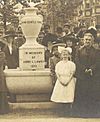 |
3rd & Bainbridge Streets | Women's Pennsylvania Society for the Prevention of Cruelty to Animals | granite | This fountain was built with money left by Annie L. Lowry. It was dedicated by Caroline Earle White. |
| Annie L. Lowry Memorial Horse Trough | 1910 |  |
Original: Fairmount Avenue & 21st Street? Current: 147 N. 2nd Street |
Women's Pennsylvania Society for the Prevention of Cruelty to Animals | granite | This trough was moved to the Fireman's Hall Museum. |
| Annie L. Lowry Memorial Horse Trough | 1910 |  |
Original: 69th Street Terminal? Current: Ridge Avenue & Fountain Street |
Women's Pennsylvania Society for the Prevention of Cruelty to Animals | granite | Located in front of Roxborough High School. |
| Edward Wetherill Memorial Fountain | around 1910 | 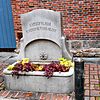 |
315 S. 9th Street | Philadelphia Fountain Society | granite | This fountain has an inscription: "A merciful man is merciful to his beast." |
| John Harrison Memorial Fountain | around 1910 |  |
Kelly Drive, East Fairmount Park | limestone | This fountain is in memory of John Harrison. | |
| Harriett S. French Fountain | 1914 | 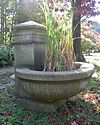 |
Belmont Avenue, West Fairmount Park | Women's Christian Temperance Union | granite | Named after Dr. Harriet S. French, who was president of the Women's Christian Temperance Union of Philadelphia. |
| Lion's Head Drinking Fountain (Penn Museum) | around 1915 |  |
University of Pennsylvania Museum | Alexander Stirling Calder, sculptor | white marble & granite | Located on the sidewalk outside the Penn Museum. |
| J. William White Memorial Drinking Fountain | 1921 |  |
Rittenhouse Square | Rittenhouse Square Flower Market Association Paul Philippe Cret, architect R. Tait McKenzie, sculptor |
limestone & bronze | This fountain honors Dr. J. William White, a famous surgeon and professor. |
| Sarah Cresson Memorial Horse Trough | 1922 |  |
Original: Front Street & Erie Avenue Current: 3rd & Spring Garden Streets |
Women's Pennsylvania Society for the Prevention of Cruelty to Animals | granite | Sarah Cresson left money for three horse troughs. |
| Sarah Cresson Memorial Horse Trough | 1922 |  |
Broad Street, Oregon Avenue & Moyamensing Avenue | Women's Pennsylvania Society for the Prevention of Cruelty to Animals | granite | This trough is located on a traffic island. |
| Two Standing Birds Fountain (Penn Museum) | around 1926-1929 | 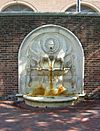 |
University of Pennsylvania Museum (East Courtyard) | Alexander Stirling Calder, sculptor | white marble | |
| Lemon Hill Pet Fountain | 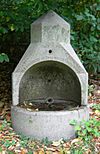 |
Sedgeley Drive, East Fairmount Park | granite | This fountain has a Bible verse inscribed on it. |
Images for kids
 | Claudette Colvin |
 | Myrlie Evers-Williams |
 | Alberta Odell Jones |


